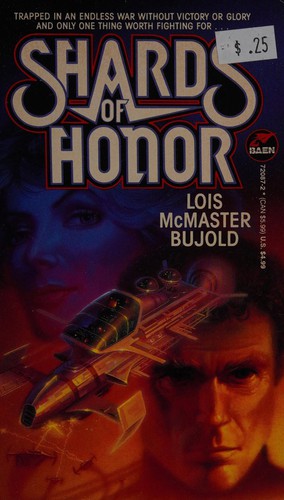enne📚 reviewed Shards of Honor by Lois McMaster Bujold
Shards of Honor
4 stars
I decided for December I'm going to just do a bunch of comfort rereading, and my brain has been clamoring for "what if you just reread all of Bujold's Vorkosigan series again (again)". I could reread just A Civil Campaign like most people do, but maybe it's time to reread them all.
Shards of Honor is the "first" book in this series, and genre-wise feels like a space opera romance. (Arguably Falling Free comes first chronologically if you're being pedantic.) If you haven't read these books, most of the series stars Miles Vorkosigan, and this book is the setup of how his parents Aral and Cordelia met and its sequel deals with the circumstances around Miles' birth.
This book does need some content warnings especially for rape, sexual assault, alcoholism, and ableism. This book was first published in 1986, and I think the book cover listed on unseen.city is doing …
I decided for December I'm going to just do a bunch of comfort rereading, and my brain has been clamoring for "what if you just reread all of Bujold's Vorkosigan series again (again)". I could reread just A Civil Campaign like most people do, but maybe it's time to reread them all.
Shards of Honor is the "first" book in this series, and genre-wise feels like a space opera romance. (Arguably Falling Free comes first chronologically if you're being pedantic.) If you haven't read these books, most of the series stars Miles Vorkosigan, and this book is the setup of how his parents Aral and Cordelia met and its sequel deals with the circumstances around Miles' birth.
This book does need some content warnings especially for rape, sexual assault, alcoholism, and ableism. This book was first published in 1986, and I think the book cover listed on unseen.city is doing it NO favors in that department either. It's definitely got a good bit of gender stereotyping going on too, but I can honestly blame a lot of that onto the Barryarans rather than the text itself.
I like the amount of worldbuilding this book gets into. There's backroom politics from a planet the reader hasn't seen involving characters the reader barely has met, and it manages to stay coherent. The setup of the book involves Aral taking Cordelia prisoner on a new planet she is surveying, and we learn a lot through both of their eyes about the wildly different cultures that they each come from. Even though the book spends a lot of time side-eyeing the militaristic aristocratic Barrayarans (for good reasons), the scene where Cordelia comes back to liberal Beta Colony and has to escape non-consensual "therapy" will always stick with me; it feels like a parallel to abusers misusing therapeutic language--the same power and control dressed up more presentably.
It must be quite a shock to suddenly find out you're pregnant, seventeen times over--at your age, too, she thought. She squelched the black humor--he was so clearly out of his depth--and took pity on his real confusion. "Take care of them, I suppose. I have no idea what that will entail, but--you did sign for them."
He sighed. "Quite, Pledged my word, in a sense." He set the problem up in familiar terms, and found his balance therein. "My word as Vorkosigan, in fact. Right. Good. Objective defined, plan of attack proposed--we're in business."
Minorly, one small character detail I noticed this time around is how much Aral and Miles orient to problems by reframing them in more comfortable contexts: Aral here, through his word and honor, and Miles later through logistics and persistence. This moment from Aral feels like a future parallel of Miles resolving the uncertainty about how to court Ekaterine by (disastrously) considering it as if he were planning a military endeavor.
I think there's some parallel to the way they both cope with failure as well, with Aral getting insensibly drunk in this book after the events of Escobar, and Miles many books later coping with the events of Memory.


